Plans for large-scale seismic surveys in the Bass Strait have raised questions about their effects on marine life, a controversial issue that is still not fully known.
While there are currently no seismic surveys being conducted in Commonwealth waters between Tasmania, Victoria and South Australia, plans have been submitted that could make it a reality.
Energy company TGS submitted plans to conduct seismic surveys in the Otway Basin, between Tasmania and Victoria, which attracted more than 30,000 public submissions.
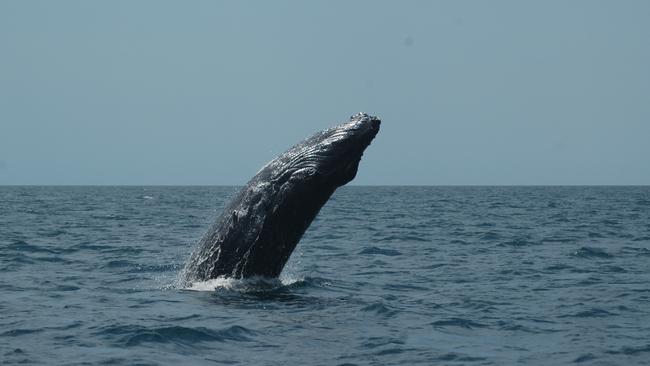
Scientific evidence has previously shown that whales who migrate through a seismic tested area stop singing because of surveying.
But it’s not just whale populations that could be threatened by seismic surveys.
“The industry is very concerned about the impacts of seismic, and the potential fatal impact on scallops and largely unknown impacts on larvae of all species,” Tasmanian Seafood Industry Council chief executive Julian Harrington said.
According to Australian Fisheries and Aquaculture statistics for 2020–21, southern rock lobster generated over $51m for Tasmania’s economy, while scallops generated over $140,000 and $4.7m at a national level in 2020–21.
The value of the Tassie scallop has increased significantly since then.
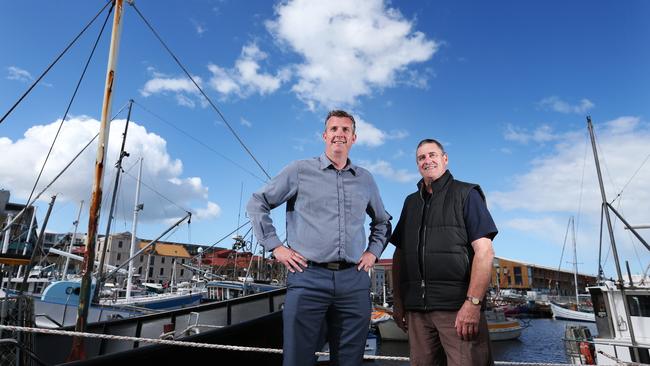
“Impacts on larvae are particularly concerning for rock lobster, given they have a 15 to 18-month larval cycle,” Mr Harrington said.
“We have also seen a lot of activity in the North-West around King Island, so we are concerned about the cumulative impacts of seismic too.”
University of Tasmania senior research fellow in marine animal physiology and biochemistry Dr Ryan Day said his latest research conducted with seismic industry operators found no mortalities occurred with octopuses exposed to seismic surveys.
“There were some effects to their physiology, so what we looked at was the octopus’s oxidative stress levels and their immune system function,” he said.
“Oxidative stress is an important one, because it’s caused by breathing in oxygen, taking oxygen from the water, in the case of the octopus. At a cellular level, our basic metabolism creates things that are harmful, so we have systems in place to get rid of those harmful things and if those systems are overwhelmed, it causes a breakdown, and you start building up these toxic products.
“We did find effects to the oxidative stress and the immune system, not in any way the octopus was on the verge of dying, but there were effects. Some of them lasted over the course of from one centre sample point to another, a couple of weeks.”
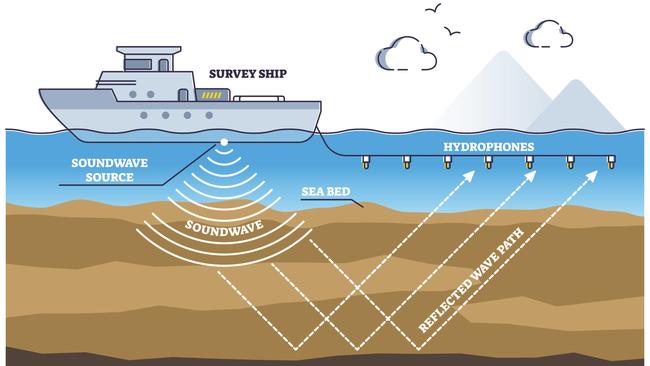
He noticed there were some behavioural effects where an exposed male octopus would stop feeding and an exposed female octopus weren’t taking care of their eggs which had been laid.
“If that female isn’t taking care of her eggs, if they’re a day from hatching it’s probably not the end of the world,” he said.
“But if it’s a couple of days, weeks, months from hatching, the female not taking care of them can lead to fungal build-up on the eggs that will kill them. It can lead to low oxygen levels because one of the things they do is jet water over them to oxygenate everything. That could have a potentially huge effect.”
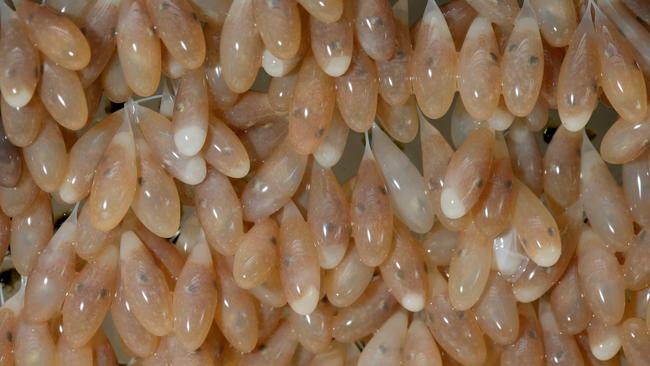
Dr Day’s previous research found exposed southern rock lobsters had an impairment where they could not right themselves because of damage to their sensory systems.
His latest research looked at juvenile southern rock lobsters which found similar impacts.
“We looked at things like their righting, so you place them on their back and time how long it takes to flip over, we found that same effect,” he said.
“Finding those same degree of impacts, and the same kind of impacts, really strengthened our previous findings.”
On top of that, Dr Day found that young lobsters stopped moulting as frequently to what they normally would.
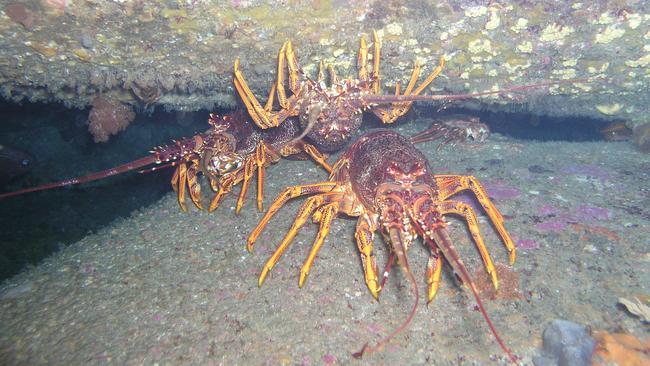
“When lobsters are young, they moult pretty frequently, so that’s when they lose their shell and that’s important because that’s the time that lobsters have to grow,” he said.
“We found the ones exposed to seismic, the moulted more slowly over a longer time in between moults. That indicates that they’re not going to be growing as well as unaffected lobsters and when you delay that moulting period, it can sort of throw things out of balance, and it’s a time of high mortality in lobsters naturally.
“When you start messing with the timing, you potentially could see more mortality around moulting with that extra stress.”
Oil and gas industry say seismic surveys low-risk, but campaigners disagree
Seismic surveys in Commonwealth waters is “low-risk” in harming marine life and produces sounds comparable to naturally occurring sounds, oil and gas industries say.
But former marine fauna observer on seismic surveying projects, Annie Ford, who left the industry to bring an end to the practice, said surveying is one of the loudest man-made noises on earth, louder than an atomic bomb.
“There’s a few ways to measure the impact – one that is really easy to understand is the decibel scale,” she said.

“Every three decibels is a doubling of power and so us as humans, we start to feel pain at 125 decibels. People start to die at 185 decibels and these companies are putting 250 to 260 decibels into the ocean with each one of those blasts.
“The average air gun will blast 256 decibels (every 10 seconds) – that is proposed in the Bass Strait and Otway Basin.”
Since the 1960s, over 2000 seismic surveys have been conducted in Australian waters, including hundreds in the Bass Strait and waters around Tasmania.
“Marine seismic surveying … is an important technology to enable offshore gas, emissions reduction and renewable developments critical for Australia’s energy security and climate targets,” Australian Energy Producers chief executive Samantha McCulloch said.
“The information gathered reduces the number of wells that need to be drilled, enhancing workplace safety and reducing environmental risk. Marine animals can and do react to sound, but research and more than 60 years of industry activity has shown that there is no evidence of any significant impact to the survivability of marine species.”

Greenpeace Australia Pacific senior campaigner Richard George said seismic surveys can deafen animals like whales.
“Fossil fuel giant Woodside – which has just had its seismic blasting plans overturned in court – even concluded in its own modelling that endangered whales could be injured by its
seismic blasting,” he said
“Instead of disrupting our oceans for gas and oil, we should be developing clean technologies like offshore wind, which is much safer for marine life.”
EnerGeo Alliance Asia-Pacific representative Simon Molyneux said seismic operators follow robust regulation and perform extensive consultation with local communities and other users of the marine environment.
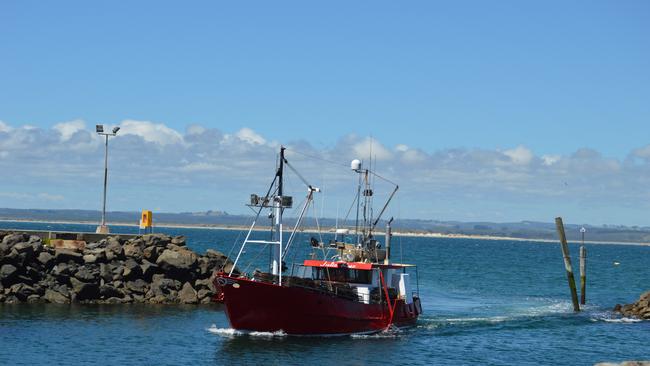
“Experience in Australia and worldwide shows that recreational and commercial fisheries are not negatively impacted by seismic surveys,” he said.
Ms Ford, who has attended consultations between communities and seismic industry operators said they use particular language designed to soften the practice.
“The favourite answer to the many questions that these companies received from locals and their concerns was that they would look into it and they didn’t. The community received very few responses,” she said.
“They have so little justification for their practices and the language that they use, the language that they force their employees to use, is designed to soften and remove scepticism of the practice.”

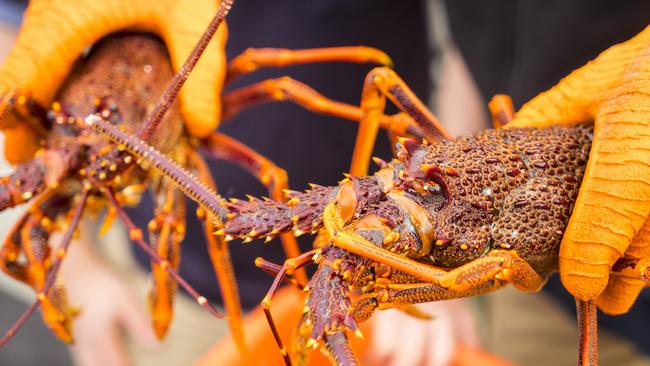
Add your comment to this story
To join the conversation, please log in. Don't have an account? Register
Join the conversation, you are commenting as Logout
How Tassie spinner will use camp for Baggy Green push
Tasmania’s ambidextrous spinner has been named to head to his home town of Chennai for a tour which he will use to push his credentials as he chases a Baggy Green. Here’s how he can do it.
‘Daddy was stabbed’: Crazed golf club attack on brother-in-law
A Tasmanian man who smashed a golf club on the arm of his sister’s partner, stabbed him in the back with it and threatened to kill him has learned his fate in court.